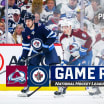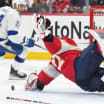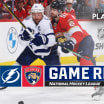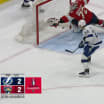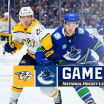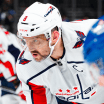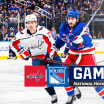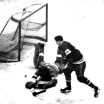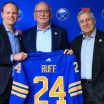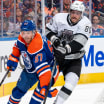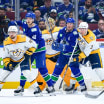The Nashville Predators advanced to the Western Conference Second Round against the San Jose Sharks with a 2-1 victory against the Anaheim Ducks at Honda Center on Wednesday in the first Game 7 in their history.
The Predators trailed the first-round series 3-2 before winning Games 6 and 7 to move on to face the Sharks.
Game 1 is at SAP Center on Friday (10:30 p.m. ET; NBCSN, SN, TVA Sports).
Sharks vs. Predators Second Round preview
Nashville must reset quickly against well-rested San Jose
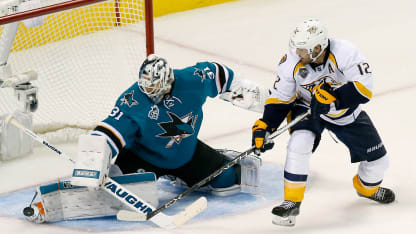
© Ezra Shaw/Getty Images
By
Shawn P. Roarke and Robby Stanley / NHL.com
Nashville hopes to find more success than the previous two times it has played San Jose in the postseason. The Sharks won 4-1 each time, in first-round series in successive seasons (2006 and 2007).
Forward Colin Wilson and defenseman Shea Weber each had two goals and five points to lead Nashville in scoring against Anaheim. Defenseman Roman Josi and forwards Filip Forsberg, James Neal and Ryan Johansen each had three points. Goalie Pekka Rinne played the entire series and allowed two goals on 64 shots over the final two games.
The Sharks advanced by defeating the Los Angeles Kings in five games of their first-round series. They have not played since their 6-3 series-clinching win Friday in Los Angeles.
Defenseman Brent Burns led San Jose with eight points (two goals, six assists). Center Joe Pavelski had five goals and an assist, and center Logan Couture had a goal and five assists. Goalie Martin Jones played every minute of the series, going 4-1-0 with a 2.18 goals-against average and .912 save percentage.
The Predators won two of three games against the Sharks during the regular season. Nashville forward Calle Jarnkrok had three goals, and Weber had two goals and an assist.
Rinne was 2-0-0, allowing three goals in two starts. Backup Carter Hutton made 38 saves in a 3-2 shootout loss April 2.
Sharks center Joe Thornton had four points (one goal, three assists) against the Predators, and Tomas Hertl had two goals. Jones was 0-2-0, allowing seven goals in two games (3.27 GAA, .868 save percentage).
The Predators are looking to advance to the conference final for the first time. The Sharks haven't been to the conference final since 2011, when they lost in five games to the Vancouver Canucks.
FORWARDS
Sharks: San Jose's top line was the driving force in its first-round victory against Los Angeles, scoring seven of its 16 goals.
Pavelski, the San Jose captain, had five goals in as many games. Thornton had one goal and two assists, and repeatedly opened up the Kings defense with his passing. Hertl had one goal and one assist.
The depth of the forward group was questioned early in the series but came to the forefront in the clinching game.
Rookie right wing Joonas Donskoi had two goals, including the game-winner, in Game 5. Center Chris Tierney and left wing Matt Nieto also had goals in that game.
Couture, the second-line center, came on strong late in the series as well and finished with six points. His right wing, Joel Ward, had four assists and was bullish along the walls and in the faceoff circle.
Forward Melker Karlsson also had a big first-round performance. He scored a goal and was one of the Sharks' primary puck pursuers, fueling an effective forecheck that often confounded the Kings' defense.
Coach Peter DeBoer consistently rolls four lines, which keeps the big guns fresh late in games.
The Sharks dressed the same 12 forwards in each game and all except Tommy Wingels averaged at least 11 minutes of ice time per game. Wingels, second among forwards with 11 shots on goal, averaged 9:49 per game.
Predators: Nashville received a pleasant surprise in the first round from Wilson. After a disappointing regular season, when he scored six goals and had 24 points, Wilson broke out against the Ducks with two goals and five points.
"I think we had talked about it being a fresh start for him," Predators coach Peter Laviolette said. "Any time you end the regular season and start the playoffs, it's a new season. You've got to make your way. If you remember back then, I had said that he was playing well at the end of the season. His line, [Mike Fisher], Wilson and [Viktor Arvidsson] really seemed to start to form some chemistry in a line that we could count on and started to produce some points.
"Even if it hadn't translated maybe the way it did in the playoffs, the chances were there, the zone time was there, the looks were there. In the playoffs here, they got on the board. [Wilson] got on the board, which was great. He had a heck of a series for us."
Laviolette made an adjustment in Game 6, putting Forsberg on Nashville's top line with Johansen and Neal, and could keep that line together to start the second round. But Forsberg spent most of the second half of the regular season and the beginning of the playoffs on the second line with Mike Ribeiro and Craig Smith.
Fourth-line center Paul Gaustad brought a physical presence in the first round and will try to do the same against San Jose. Gaustad has also traditionally been very effective in the faceoff circle; he won 55.4 percent of his faceoffs against the Ducks and had a 54.1 winning percentage in the defensive zone.
DEFENSEMEN
Sharks: Burns had eight points against the Kings, including three on the power play. He averaged 23:58 of ice time per game, tops among San Jose defensemen. He was as good, if not better, than Drew Doughty, the Kings' best defenseman, in the first round.
Burns is dangerous in so many ways. His ability to move the puck in the offensive zone is the trigger for the Sharks attack and his ability to transition out of the defensive zone can negate an aggressive forecheck.
Marc-Edouard Vlasic, who returned to the lineup from injury in Game 1 against the Kings, averaged 23:12 of ice time per game and led the Sharks with 18 blocked shots.
Paul Martin was on top of his game as Burns' partner in the first round. His defensive responsibility allows Burns to jump into the play at will and make the Sharks more dangerous on the attack.
Predators: Nashville finished the regular season tied for the most points in the NHL by defensemen and continued getting offensive contributions from them in the first round.
Weber (five points) and Mattias Ekholm finished the series against the Ducks with two goals each and Josi had three assists. Getting offense from their defensemen is going to be a focal point of the game plan against the Sharks.
The Predators allowed two goals in the final two games of the first round, both elimination games. Barret Jackman and Anthony Bitetto served as Nashville's third defensive pair, but the Sharks will get a heavy dose of Weber, Josi, Ekholm and Ryan Ellis in the second round.
Josi averaged 27:16 of ice time and 33.6 shifts per game. His average shift length was 48 seconds, so the Predators are going to rely on his stamina to shut down some of the Sharks' most dangerous offensive weapons.
GOALTENDERS
Sharks: There were many questions about Jones entering the first round. Jones, obtained in a trade in June 2015, had never started a Stanley Cup Playoff game and made his first start against his former team.
He responded with an economical performance and rarely showed signs of strain in a series where the first four games were decided by one goal.
Jones allowed two or fewer goals to a high-powered Kings offense in three of the five games.
Before the playoffs there were some who believed backup James Reimer would see time in the San Jose net. After the first round, that group is much smaller.
Predators: Rinne had shaky numbers through the first five games of the first round but responded with two stellar performances in the final two games. Rinne made 36 saves in Game 7, allowing one goal, on a power play.
"Over the years, he's made some huge acrobatic saves," Weber said. "He was just really solid. Made all the saves he needed to, didn't get himself into too much trouble and obviously was a big reason we were able to win."
Rinne finished the series with 2.45 goals-against average and a .915 save percentage. The Predators will need him to play against the Sharks the same way he did in Games 6 and 7 against the Ducks.
COACHES
Sharks: DeBoer provided a steadying hand in the first round to a team that has struggled in recent playoff series. He never allowed the Sharks to get too high or too low.
Midway through the series, he called out his fourth line for taking too many penalties and not contributing enough. It responded with its best performances in the final two games.
DeBoer has kept a veteran team sharp mentally and given it considerable time off the ice to remain fresh this deep into the season.
Predators: Laviolette was faced with some challenges in the first round, particularly when he lost a forward to injury in two games and was forced to juggle his lines.
Laviolette has a 5-1 record in Game 7 in his career. He knows how to get the most out of his team when it is needed.
Laviolette made lineup adjustments throughout the series and moved Forsberg up to the first line with Johansen and Neal. His poise when falling behind 3-2 in the series was beneficial to a team that doesn't have much playoff experience.
SPECIAL TEAMS
Sharks: San Jose's power play was deadly in the first round. It scored five man-advantage goals and had another goal one second after a penalty to the Kings expired. It was the difference-maker in a series that was far more even during 5-on-5 play.
Pavelski, Burns, Couture and Patrick Marleau each had three power-play points against the Kings.
There is a comfort level among the players that have been on the power play for several seasons that make it such a dangerous unit. The Sharks were the third-best power-play team in the regular season, converting at 22.5 percent.
They were not nearly as good defending on the power play, killing 78.6 percent of the chances against the Kings.
Predators: Nashville struggled mightily on the power play in the first round, going 1-for-26.
Nashville's power play will have to improve in the second round, and Weber, and his big shot, will be a big part of that. He scored the lone power-play goal for the Predators in Game 2 of the first round, and his slap shot is one of the most dangerous power-play weapons in the NHL.
The Predators were effective on the penalty kill, killing off 21 of 25 penalties. They will be faced with a big challenge against the Sharks, who converted on five of 21 power-play chances in their first-round series.
SERIES CHANGERS
Sharks: Patrick Marleau, forward -- Marleau was strong on the power play but had one even-strength point in the first round. If he can pick up his game and give the second line a jolt, the Sharks will become even more dangerous and less reliant on the Thornton line to carry the load. Marleau has 107 points in 152 Stanley Cup Playoff games.
Predators: Craig Smith, forward - Nashville was 4-0 in the first round when Smith played a complete game and 0-3 when he did not. Smith had one goal and one assist, but dealt with a lower-body injury he sustained in Game 3. Smith's speed sets him apart from other Predators forwards and he is a key piece to their secondary scoring. Smith usually is slotted on Nashville's second line alongside Ribeiro, who is a pass-first player. He averaged two shots on goal per game in the first round. If Smith can fully recover from his injury, he could be a dangerous part of the attack.
WILL WIN IF …
Sharks:They can get depth scoring. Every team that faces San Jose knows shutting down the Thornton line is the first priority. The Sharks need to make teams pay for concentrating on that. Game 5 against the Kings was a perfect example; San Jose received goals from third- and fourth-line players to blow open a tie game in the third period.
Predators: They continue to get strong 5-on-5 play and can convert more often on the power play. The Predators were at their best against the Ducks when they were at even strength and got in on the forecheck. Their style of play is particularly effective when they grab the lead because they can clamp down defensively and force chances from the outside. As for the power play, San Jose's penalty kill isn't as good statistically as Anaheim's was in the first round, so Nashville could have better success.
